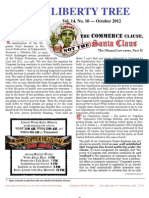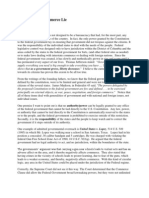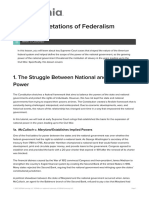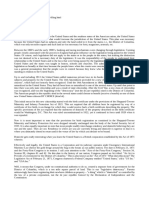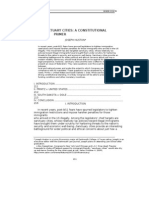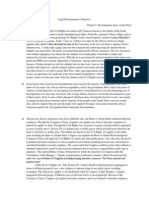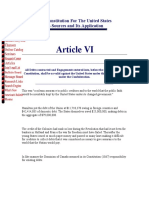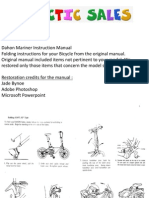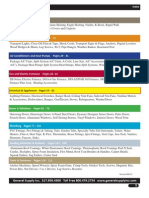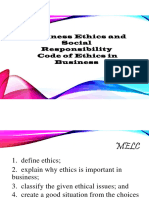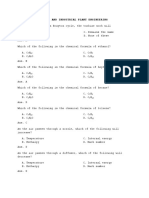Is It Permissible 2
Is It Permissible 2
Uploaded by
Joseph AltmannCopyright:
Available Formats
Is It Permissible 2
Is It Permissible 2
Uploaded by
Joseph AltmannOriginal Description:
Copyright
Available Formats
Share this document
Did you find this document useful?
Is this content inappropriate?
Copyright:
Available Formats
Is It Permissible 2
Is It Permissible 2
Uploaded by
Joseph AltmannCopyright:
Available Formats
Commerce Clause Abuse written by Dr. Walter E.
Williams Several weeks ago, under the title "Is It Permissible", I discussed how Congress systematically abuses the Constitution's "welfare clause" to control our lives in ways that would have been an abomination to the Framers. Quite a few readers pointed to my omission of Congress's companion tool to circumvent both the letter and spirit of the Constitution, namely the "commerce clause." The Constitution's Article I, Section 8, paragraph 3 gives Congress authority "To regulate Commerce with Foreign Nations, and among the several States, and with the Indian Tribes." During the war, the thirteen colonies formed a union under the Articles of Confederation (1778) whereby, "Each state retains its sovereignty, freedom, and independence, and every power, jurisdiction, and right, which is not by this Confederation expressly delegated to the United States, in Congress assembled." The Treaty of Paris (1783) that ended the war between the colonies and Great Britain recognized thirteen sovereign nations. A key failing of the Articles of Confederation was the propensity of states to erect protectionist trade barriers. When the Framers met in Philadelphia in 1787 and wrote the constitution that governs us today, they addressed that failure and through the commerce and the privileges and immunities clauses that created a national free-trade zone. Thus, the original purpose of the commerce clause was primarily a means to eliminate trade barriers among the states. They didn't intend for the commerce clause to govern so much of our lives. Indeed, as James Madison, the father of our Constitution, explained, "The powers delegated by the proposed Constitution to the federal government are few and defined. Those which are to remain in the State governments are numerous and indefinite." For most of our history, the Courts foiled congressional attempts to use the "commerce clause" to sabotage the clear meaning of the Constitution, particularly the Ninth and Tenth Amendments. The Courts began caving in to congressional tyranny during the 1930s. That tyranny was sealed in 1942 by a little known U.S. Supreme ruling in Wickard v. Filburn. Mr. Filburn was a small farmer in Ohio. The Department of Agriculture had set production quotas. Mr. Filburn harvested nearly 12 acres of wheat above his government allotment. He argued that the excess wheat was unrelated to commerce since he grew it for his own use. He was fined anyway. The Court reasoned that had he not grown the extra wheat he would have had to purchase wheat; therefore, he was indirectly affecting interstate commerce. If there's any good news, it's the tiny step the U.S. Supreme Court took in its in U.S. v. Lopez (1995) ruling. In 1990, Congress passed the Gun-Free School Zones Act, citing their powers under the "commerce clause." Namely, the possession of a firearm in a
local school zone substantially affected interstate commerce. Why? Violent crime raises insurance costs and those costs are spread throughout the population. Violent crime reduces the willingness of individuals to travel to high-crime areas within the country. Finally, crime threatens the learning environment thereby reducing national productivity. While all of this might be true, the relevant question is whether Congress had constitutional authority to pass the Gun-Free School Zones Act. The U.S. Supreme Court ruled it didn't saying, "If we were to accept the Government's arguments, we are hard pressed to posit any activity by an individual that Congress is without power to regulate." In other words, the hours children spend studying, the amount of rest they get and what they eat has something to do with learning. Congress could easily manufacture a case for the regulation of these activities based on their perverted interpretation of the "commerce clause." While the Lopez ruling is a tiny step in the right direction, there's much more to be done. Constitution-respecting Americans should demand the impeachment of congressmen and other elected officials who ignore their oath of office to uphold and defend the Constitution. Walter E. Williams c44-03 October 30, 2003 Return to Articles Page
You might also like
- The Declaration of Nullification 2024Document8 pagesThe Declaration of Nullification 2024The Founding Sons100% (3)
- Slavery's Constitution: From Revolution to RatificationFrom EverandSlavery's Constitution: From Revolution to RatificationRating: 4 out of 5 stars4/5 (12)
- 174 - The Organic Act of 1871Document2 pages174 - The Organic Act of 1871David E Robinson100% (14)
- Why The Ucc Filing Enslavement of The American People by LawyersDocument125 pagesWhy The Ucc Filing Enslavement of The American People by LawyersGemini Research96% (48)
- How Democratic Is The American Constitution by Robert A. DahlDocument7 pagesHow Democratic Is The American Constitution by Robert A. Dahlbrucewphillips0% (1)
- Saitama Inu Whitepaper v1Document12 pagesSaitama Inu Whitepaper v1Sameer100% (1)
- Final Draft 3Document5 pagesFinal Draft 3api-610033121No ratings yet
- Essay Exam #1Document4 pagesEssay Exam #1Peter DiazNo ratings yet
- Lawyer's Secret OathDocument11 pagesLawyer's Secret OathFreeman Lawyer100% (10)
- Constitutional LawDocument21 pagesConstitutional LawJnb ChiocoNo ratings yet
- Gibbons V Ogden DBQDocument2 pagesGibbons V Ogden DBQcarriemarieflynnNo ratings yet
- Standing: Lujan v. Defenders of Wildlife, 504 U.S. 555 (1992), Was A United States Supreme Court CaseDocument32 pagesStanding: Lujan v. Defenders of Wildlife, 504 U.S. 555 (1992), Was A United States Supreme Court Casevexion42No ratings yet
- Con Law OutlineDocument72 pagesCon Law OutlineAdam DippelNo ratings yet
- Upreme Ourt: DramaDocument299 pagesUpreme Ourt: DramaKhalid KhairNo ratings yet
- Liberty Tree: Santa Santa Santa Santa Claus Claus Claus ClausDocument4 pagesLiberty Tree: Santa Santa Santa Santa Claus Claus Claus ClauslwrnNo ratings yet
- 8-15-10 Howard Freeman - The Two United States and The LawDocument10 pages8-15-10 Howard Freeman - The Two United States and The Lawpower_No ratings yet
- The Constitution: Focus On Application To BusinessDocument33 pagesThe Constitution: Focus On Application To BusinessStanley CkNo ratings yet
- Why The UccDocument11 pagesWhy The UccI have rejoined myself with the cause by Charles W. Iseley/Isley for personal reasons. I'll follow the Sun.100% (2)
- How Does The Constitution Protect Against Tyranny?Document4 pagesHow Does The Constitution Protect Against Tyranny?Jacob Alan HensonNo ratings yet
- Interstate Commerce LieDocument5 pagesInterstate Commerce Lielemieuxm327No ratings yet
- Very Short Con Law OutlineDocument17 pagesVery Short Con Law OutlineDanPohlmanNo ratings yet
- Missouri Vs HollandDocument4 pagesMissouri Vs HollandsirenangblueNo ratings yet
- Economic Liberty and The Constitution, Part 1: by Jacob G. HornbergerDocument5 pagesEconomic Liberty and The Constitution, Part 1: by Jacob G. Hornbergerj94102No ratings yet
- Early Interpretations of FederalismDocument6 pagesEarly Interpretations of Federalismbmoneybookings100No ratings yet
- Why The UCC Filing?Document8 pagesWhy The UCC Filing?Ven Geancia100% (2)
- Drowning in TyrannyDocument15 pagesDrowning in TyrannyMatt Erickson100% (3)
- Po Co Składa Się Dokumenty UccDocument11 pagesPo Co Składa Się Dokumenty UccJoannaNo ratings yet
- 3-Parens Patriae.... Government As ParentDocument8 pages3-Parens Patriae.... Government As ParentOneNation100% (1)
- TJ Mayes 2015 Constitution CafeDocument8 pagesTJ Mayes 2015 Constitution CafeTJ MayesNo ratings yet
- Gold, Money and The US ConstitutionDocument31 pagesGold, Money and The US ConstitutionEugene C. HollowayNo ratings yet
- Sanctuary Cities: A Constitutional Primer: Huston - Doc 8/18/08 10:24 PMDocument6 pagesSanctuary Cities: A Constitutional Primer: Huston - Doc 8/18/08 10:24 PMAirB13No ratings yet
- Con Law Outline E&EDocument18 pagesCon Law Outline E&ETony Aguilar100% (1)
- America and The International CovenantDocument4 pagesAmerica and The International CovenantpuretrustNo ratings yet
- Ucc InfoDocument30 pagesUcc InfoCharles Jose Mitchell100% (1)
- Separation of PowersDocument24 pagesSeparation of Powersnkata560% (1)
- Right To Bear Arms 2Document219 pagesRight To Bear Arms 2Bleak NarrativesNo ratings yet
- Con Law Oultine-PersonalDocument5 pagesCon Law Oultine-PersonalAshley DanielleNo ratings yet
- The US ConstitutionDocument8 pagesThe US ConstitutiondrtimadamsNo ratings yet
- Why The UCC FilingDocument8 pagesWhy The UCC Filingsmo-kay100% (15)
- A Great FraudDocument38 pagesA Great FraudHorsetail Goatsfoot100% (6)
- Parens Patriae.... Government As ParentDocument6 pagesParens Patriae.... Government As ParentBrave_Heart_Ministry100% (1)
- The Great DeceptionDocument22 pagesThe Great DeceptionAlyssa Daniels100% (1)
- Matthew Shea - Resist DCDocument5 pagesMatthew Shea - Resist DCJohn SutherlandNo ratings yet
- Lee Brobst - The Law, Your Money, Your ChoiceDocument19 pagesLee Brobst - The Law, Your Money, Your Choiceprivatebank101No ratings yet
- Why Machine Guns and Marijuana May Have More in Common Than You Think.Document2 pagesWhy Machine Guns and Marijuana May Have More in Common Than You Think.Alan BrooksNo ratings yet
- Administrative Agencies - The Fourth Branch of GovernmentDocument10 pagesAdministrative Agencies - The Fourth Branch of Governmentsleepysalsa100% (1)
- The Law The Money & Your Choice PDFDocument24 pagesThe Law The Money & Your Choice PDFAnonymous 5dtQnfKeTq100% (1)
- Corporate PersonhoodDocument14 pagesCorporate PersonhoodMarch ElleneNo ratings yet
- OCA Amicus BriefDocument35 pagesOCA Amicus BriefSarah JaneNo ratings yet
- 2007 Amar Entire Course OutlineDocument119 pages2007 Amar Entire Course OutlineLiam MurphyNo ratings yet
- US V Lopez Case BriefDocument2 pagesUS V Lopez Case Briefemberlyvick1No ratings yet
- The Collective Name For The First Ten Amendments To The United States ConstitutionDocument2 pagesThe Collective Name For The First Ten Amendments To The United States ConstitutionSam Sat PatNo ratings yet
- Eyes On The Prize AnalysisDocument2 pagesEyes On The Prize Analysistesttest1No ratings yet
- Article V Convention of States Pocket Guide BOOKLETDocument48 pagesArticle V Convention of States Pocket Guide BOOKLETCraig SwensonNo ratings yet
- The Argument Against The ConfederacyDocument9 pagesThe Argument Against The ConfederacyMaya PatelNo ratings yet
- SHALL NOT: The State Level Plan To Protect The 2nd AmendmentDocument14 pagesSHALL NOT: The State Level Plan To Protect The 2nd AmendmentTenth Amendment CenterNo ratings yet
- Part 1: The Evolution of Con LawDocument30 pagesPart 1: The Evolution of Con LawStacey ReeceNo ratings yet
- Constitution - Article VIDocument7 pagesConstitution - Article VIBob JohnsonNo ratings yet
- After the Collapse of America: The Democratic Republic of AmericaFrom EverandAfter the Collapse of America: The Democratic Republic of AmericaNo ratings yet
- 2014 Zerostart Application Guide and Product Catalog PDFDocument100 pages2014 Zerostart Application Guide and Product Catalog PDFJoseph AltmannNo ratings yet
- Baby Gap: The Surprising Truth About America's Infant-Mortality RateDocument2 pagesBaby Gap: The Surprising Truth About America's Infant-Mortality RateJoseph AltmannNo ratings yet
- Dahon Mariner ManualDocument3 pagesDahon Mariner ManualJoseph Altmann0% (1)
- United States Securities and Exchange Commission Form 8-K: Washington, D.C. 20549Document8 pagesUnited States Securities and Exchange Commission Form 8-K: Washington, D.C. 20549Joseph AltmannNo ratings yet
- Mobile Home SupplyDocument111 pagesMobile Home SupplyJoseph AltmannNo ratings yet
- Bread MakerDocument22 pagesBread MakerJoseph AltmannNo ratings yet
- Cecilware UGOLINI NHT Slushie Machine Manual PDFDocument23 pagesCecilware UGOLINI NHT Slushie Machine Manual PDFJoseph AltmannNo ratings yet
- Blair Electronic SignDocument31 pagesBlair Electronic SignJoseph AltmannNo ratings yet
- Maintenance Intervals: Operation and Maintenance Manual ExcerptDocument49 pagesMaintenance Intervals: Operation and Maintenance Manual ExcerptJoseph Altmann100% (2)
- ToyotaDocument2 pagesToyotaJoseph AltmannNo ratings yet
- Hot Towels3Document2 pagesHot Towels3Joseph AltmannNo ratings yet
- Hot Towels4Document2 pagesHot Towels4Joseph AltmannNo ratings yet
- Precision Time InstrumentsDocument12 pagesPrecision Time InstrumentsJoseph AltmannNo ratings yet
- WaterDocument1 pageWaterJoseph AltmannNo ratings yet
- House Parts 2Document1 pageHouse Parts 2Joseph AltmannNo ratings yet
- Hot Towels2Document1 pageHot Towels2Joseph AltmannNo ratings yet
- House Parts 3Document1 pageHouse Parts 3Joseph AltmannNo ratings yet
- Body Parts4Document1 pageBody Parts4Joseph AltmannNo ratings yet
- Body Parts5Document1 pageBody Parts5Joseph AltmannNo ratings yet
- Body Parts3Document1 pageBody Parts3Joseph AltmannNo ratings yet
- Body Parts3Document1 pageBody Parts3Joseph AltmannNo ratings yet
- Body Parts2Document1 pageBody Parts2Joseph AltmannNo ratings yet
- Body Parts4Document1 pageBody Parts4Joseph AltmannNo ratings yet
- Sharp TonDocument3 pagesSharp TonJoseph AltmannNo ratings yet
- Torts and Damages SY 2018 IDocument15 pagesTorts and Damages SY 2018 IMark De JesusNo ratings yet
- Elsa Online. ElsaWin. ElsaWeb. VW1.6 L - 75 KW - Simos, Engine Code ALZ, From October 2000Document1 pageElsa Online. ElsaWin. ElsaWeb. VW1.6 L - 75 KW - Simos, Engine Code ALZ, From October 2000Dumitrescu emanuel victorNo ratings yet
- Advice To Client Activities (Answers)Document12 pagesAdvice To Client Activities (Answers)Tooba AamirNo ratings yet
- W3 Lesson 4.1 Code of Ethics in BusinessDocument33 pagesW3 Lesson 4.1 Code of Ethics in BusinessHeron LacanlaleNo ratings yet
- Datasheet Tango G4 BVP43X - GM - 202011Document4 pagesDatasheet Tango G4 BVP43X - GM - 202011LobooNo ratings yet
- Scrap Specifications Circular 2018 PDFDocument62 pagesScrap Specifications Circular 2018 PDFheruNo ratings yet
- University Management System 4Document25 pagesUniversity Management System 4panchal0362No ratings yet
- Pipe CNS 06Document30 pagesPipe CNS 06maria katherine pantojaNo ratings yet
- A6M LTCC SystemDocument2 pagesA6M LTCC SystemkaleemafridiNo ratings yet
- IP-432 English WEBDocument171 pagesIP-432 English WEBRaul Sanchez RoyNo ratings yet
- Property Cases.. AccessionDocument90 pagesProperty Cases.. AccessionRussel SirotNo ratings yet
- Interswitch - Electronic Payment and Digital Commerce Solutions.Document4 pagesInterswitch - Electronic Payment and Digital Commerce Solutions.Gbadeyanka O WuraolaNo ratings yet
- Surrey's Dog Responsibility BylawDocument16 pagesSurrey's Dog Responsibility BylawkdiakiwNo ratings yet
- Green House Gas Emissions in Refineries and Its Mitigation MeasuresDocument42 pagesGreen House Gas Emissions in Refineries and Its Mitigation MeasuresSarah DeanNo ratings yet
- 0460 - w22 - in - 43 IGCSE WorksheetDocument12 pages0460 - w22 - in - 43 IGCSE Worksheetamartya k singhNo ratings yet
- 016-2020 KALAHI BDRRMC Resolution Adopting DROP & Concurring BGADocument2 pages016-2020 KALAHI BDRRMC Resolution Adopting DROP & Concurring BGAbarangaybingayNo ratings yet
- Operation ManualDocument10 pagesOperation ManualBaeMoonSeobNo ratings yet
- Michael J. Lewis: 132 Baybright Drive, Shirley N.Y. 11967 (631) 740-4562Document1 pageMichael J. Lewis: 132 Baybright Drive, Shirley N.Y. 11967 (631) 740-4562MichaelLewisNo ratings yet
- Batik Air - PRATAMA MARHADI 26 JUNI 2023Document2 pagesBatik Air - PRATAMA MARHADI 26 JUNI 2023eko handoyoNo ratings yet
- Interior and Exterior Angles of A TriangleDocument2 pagesInterior and Exterior Angles of A TriangleMelody GerardoNo ratings yet
- Research Paper About Electronic CigaretteDocument8 pagesResearch Paper About Electronic Cigarettefzkq3g82100% (1)
- Cryogenic Air Separation, Histroy and Technological ProcessDocument20 pagesCryogenic Air Separation, Histroy and Technological ProcessJason Thomas100% (2)
- HKMagazine 07112014Document48 pagesHKMagazine 07112014apparition9No ratings yet
- Air TicketDocument110 pagesAir TicketRiya GuinNo ratings yet
- ETABS Shear Wall DesignDocument2 pagesETABS Shear Wall DesignFares ShawadfyNo ratings yet
- I/A Series System Administration Guide (Windows NT Operating System)Document112 pagesI/A Series System Administration Guide (Windows NT Operating System)Demetri M. ScytheNo ratings yet
- Literature Review (Elbow Mechanism)Document15 pagesLiterature Review (Elbow Mechanism)Naveen ShuklaNo ratings yet
- Repairing Flooded BuildingsDocument110 pagesRepairing Flooded BuildingsDivisha JindalNo ratings yet
- Whirlpool ADG689 - Ix DishwasherDocument13 pagesWhirlpool ADG689 - Ix Dishwasherairwolf4226No ratings yet














